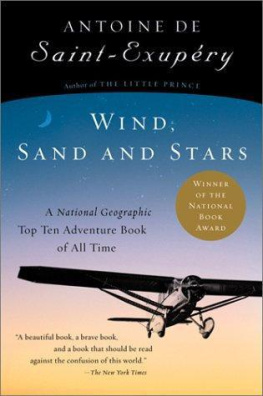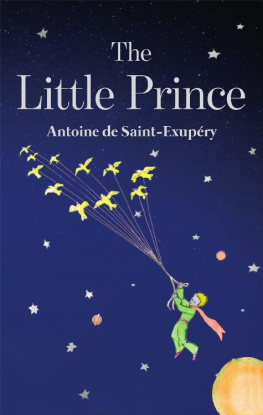Antoine St. Exupery - Wind, Sand and Stars
Here you can read online Antoine St. Exupery - Wind, Sand and Stars full text of the book (entire story) in english for free. Download pdf and epub, get meaning, cover and reviews about this ebook. genre: Humor. Description of the work, (preface) as well as reviews are available. Best literature library LitArk.com created for fans of good reading and offers a wide selection of genres:
Romance novel
Science fiction
Adventure
Detective
Science
History
Home and family
Prose
Art
Politics
Computer
Non-fiction
Religion
Business
Children
Humor
Choose a favorite category and find really read worthwhile books. Enjoy immersion in the world of imagination, feel the emotions of the characters or learn something new for yourself, make an fascinating discovery.
- Book:Wind, Sand and Stars
- Author:
- Genre:
- Rating:5 / 5
- Favourites:Add to favourites
- Your mark:
- 100
- 1
- 2
- 3
- 4
- 5
Wind, Sand and Stars: summary, description and annotation
We offer to read an annotation, description, summary or preface (depends on what the author of the book "Wind, Sand and Stars" wrote himself). If you haven't found the necessary information about the book — write in the comments, we will try to find it.
Wind, Sand and Stars — read online for free the complete book (whole text) full work
Below is the text of the book, divided by pages. System saving the place of the last page read, allows you to conveniently read the book "Wind, Sand and Stars" online for free, without having to search again every time where you left off. Put a bookmark, and you can go to the page where you finished reading at any time.
Font size:
Interval:
Bookmark:
Wind, Sand and Stars
by
Antoine de St. Exupery
First Published 1939
Translated from the French by
Lewis Galantire
Contents
The Craft
In 1926 I was enrolled as student airline pilot by the Latcore Company, the predecessors of Aropostale (now Air France) in the operation of the line between Toulouse, in southwestern France, and Dakar, in French West Africa I was learning the craft, undergoing an apprenticeship served by all young pilots before they were allowed to carry the mails. We took ships up on trial spins, made meek little hops between Toulouse and Perpignan, and had dreary lessons in meteorology in a freezing hangar. We lived in fear of the mountains of Spain, over which we had yet to fly, and in awe of our elders.
These veterans were to be seen in the field restaurant - gruff, not particularly approachable, and inclined somewhat to condescension when giving us the benefit of their experience. When one of them landed, rain-soaked and behind schedule, from Alicante or Casablanca, and one of us asked humble questions about his flight, the very curtness of his replies on these tempestuous days was matter enough out of which to build a fabulous world filled with snares and pitfalls, with cliffs suddenly looming out of fog and whirling air-currents of a strength to uproot cedars. Black dragons guarded the mouths of the valleys and clusters of lightning crowned the crests - for our elders were always at some pains to feed our reverence. But from time to time one or another of them, eternally to be revered, would fail to come back.
I remember, once, a homecoming of Bury, he who was later to die in a spur of the Pyrenees. He came into the restaurant, sat down at the common table, and went stolidly at his food, shoulders still bowed by the fatigue of his recent trial. It was at the end of one of those foul days when from end to end of the line the skies are filled with dirty weather, when the mountains seem to a pilot to be wallowing in slime like exploded cannon on the decks of an antique man-o'-war.
I stared at Bury, swallowed my saliva, and ventured after a bit to ask if he had had a hard flight. Bury, bent over his plate in frowning absorption, could not hear me. In those days we flew open ships and thrust our heads out round the windshield, in bad weather, to take our bearings: the wind that whistled in our ears was a long time clearing out of our heads. Finally Bury looked up, seemed to understand me, to think back to what I was referring to, and suddenly he gave a bright laugh. This brief burst of laughter, from a man who laughed little, startled me. For a moment his weary being was bright with it. But he spoke no word, lowered his head, and went on chewing in silence. And in that dismal restaurant, surrounded by the simple government clerks who sat there repairing the wear and tear of their humble daily tasks, my broad-shouldered messmate seemed to me strangely noble; beneath his rough hide I could discern the angel who had vanquished the dragon.
The night came when it was my turn to be called to the field manager's room.
He said: "You leave tomorrow."
I stood motionless, waiting for him to dismiss me. After a moment of silence he added: "I take it you know the regulations?"
In those days the motor was not what it is today. It would drop out, for example, without warning and with a great rattle like the crash of crockery. And one would simply throw in one's hand: there was no hope of refuge on the rocky crust of Spain. "Here," we used to say, "when your motor goes, your ship goes, too."
An airplane, of course, can be replaced. Still, the important thing was to avoid a collision with the range; and blind flying through a sea of clouds in the mountain zones was subject to the severest penalties. A pilot in trouble who buried himself in the white cotton-wool of the clouds might all unseeing run straight into a peak. This was why, that night, the deliberate voice repeated insistently its warning:
"Navigating by the compass in a sea of clouds over Spain is all very well, it is very dashing, but -"
And I was struck by the graphic image:
"But you want to remember that below the sea of clouds lies eternity."
And suddenly that tranquil cloud-world, that world so harmless and simple that one sees below on rising out of the clouds, took on in my eyes a new quality. That peaceful world became a pitfall. I imagined the immense white pitfall spread beneath me. Below it reigned not what one might think - not the agitation of men, not the living tumult and bustle of cities, but a silence even more absolute than in the clouds, a peace even more final. This viscous whiteness became in my mind the frontier between the real and the unreal, between the known and the unknowable. Already I was beginning to realize that a spectacle has no meaning except it be seen through the glass of a culture, a civilization, a craft. Mountaineers too know the sea of clouds, yet it does not seem to them the fabulous curtain it is to me.
When I left that room I was filled with a childish pride. Now it was my turn to take on at dawn the responsibility of a cargo of passengers and the African mails. But at the same time I felt very meek. I felt myself ill-prepared for this responsibility. Spain was poor in emergency fields; we had no radio; and I was troubled lest when I got into difficulty I should not know where to hunt a landing-place. Staring at the aridity of my maps, I could see no help in them; and so, with a heart full of shyness and pride, I fled to spend this night of vigil with my friend Guillaumet. Guillaumet had been over the route before me. He knew all the dodges by which one got hold of the keys to Spain. I should have to be initiated by Guillaumet.
When I walked in he looked up and smiled.
"I know all about it," he said. "How do you feel?" He went to a cupboard and came back with glasses and a bottle of port, still smiling.
"We'll drink to it. Don't worry. It's easier than you think."
Guillaumet exuded confidence the way a lamp gives off light. He was himself later on to break the record for postal crossings in the Andes and the South Atlantic. On this night, sitting in his shirtsleeves, his arms folded in the lamplight, smiling the most heartening of smiles, he said to me simply:
"You'll be bothered from time to time by storms, fog, snow. When you are, think of those who went through it before you, and say to yourself, 'What they could do, I can do.' "
I spread out my maps and asked him hesitantly if he would mind going over the hop with me. And there, bent over in the lamplight, shoulder to shoulder with the veteran, I felt a sort of schoolboy peace.
But what a strange lesson in geography I was given! Guillaumet, did not teach Spain to me, he made the country my friend. He did not talk about provinces, or peoples, or livestock. Instead of telling me about Guadix, he spoke of three orange-trees on the edge of the town: "Beware of those trees. Better mark them on the map." And those three orange-trees seemed to me thenceforth higher than the Sierra Nevada.
He did not talk about Lorca, but about a humble farm near Lorca, a living farm with its farmer and the farmer's wife. And this tiny, this remote couple, living a thousand miles from where we sat, took on a universal importance. Settled on the slope of a mountain, they watched like lighthouse-keepers beneath the stars, ever on the lookout to succor men.
The details that we drew up from oblivion, from their inconceivable remoteness, no geographer had been concerned to explore. Because it washed the banks of great cities, the Ebro River was of interest to mapmakers. But what had they to do with that brook running secretly through the water-weeds to the west of Motril, that brook nourishing a mere score or two of flowers?
"Careful of that brook: it breaks up the whole field. Mark it on your map." Ah, I was to remember that serpent in the grass near Motril! It looked like nothing at all, and its faint murmur sang to no more than a few frogs; but it slept with one eye open. Stretching its length along the grasses in the paradise of that emergency landing-field, it lay in wait for me a thousand miles from where I sat. Given the chance, it would transform me into a flaming candelabra. And those thirty valorous sheep ready to charge me on the slope of a hill! Now that I knew about them I could brace myself to meet them.
Font size:
Interval:
Bookmark:
Similar books «Wind, Sand and Stars»
Look at similar books to Wind, Sand and Stars. We have selected literature similar in name and meaning in the hope of providing readers with more options to find new, interesting, not yet read works.
Discussion, reviews of the book Wind, Sand and Stars and just readers' own opinions. Leave your comments, write what you think about the work, its meaning or the main characters. Specify what exactly you liked and what you didn't like, and why you think so.











